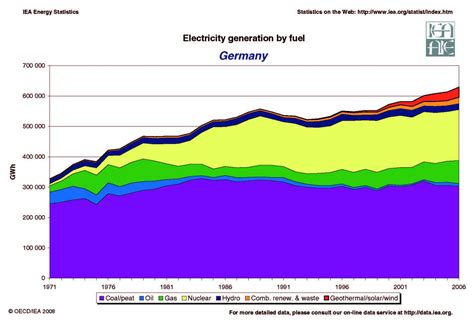In mid-April 2023, Germany marked the end of an era by officially exiting nuclear power, a move that has long been planned and debated within the country. The year following this pivotal decision has seen Germany make substantial investments in renewable energy, notably increasing its electricity generation from sources such as wind and solar. The overall renewable energy generation surged by 33 TWh, reaching 270 TWh in total during the period from April 2023 to April 2024. Renewable energy now accounts for 58.8% of Germany’s electrical load, a remarkable achievement. This shift underscores the country’s commitment to sustainable energy, reducing reliance on nuclear and fossil fuels simultaneously.
One of the significant outcomes of Germany’s nuclear exit is a noticeable reduction in fossil fuel usage. Although some skeptics, like epanchin, questioned whether the reduction in fossil fuels might have been more significant had nuclear power remained a part of the energy mix, others like GTP pointed out that the transition has been primarily attributed to favorable conditions and prices for renewable energy production, particularly from neighboring regions such as the Alps and Scandinavia, rather than the direct result of abandoning nuclear energy.
Contrary to initial concerns that the loss of nuclear power could lead to an increased dependence on imported fossil fuels, Germany managed to sidestep this pitfall. As noted by throw0101c, the country has instead relied on a mix of imported renewable electricity and its expanded domestic renewable capacity. Interestingly, favorable prices for renewable electricity from neighboring regions have played a crucial role in balancing out the energy deficit left by the shutdown of nuclear power plants. This highlights a critical aspect of Germany’s strategy—leveraging geographical and economic advantages to support its energy transition.
Despite the positive strides in renewable energy, the transition has not been without its economic challenges. Commenters like ernst_klim and PinguTS have highlighted the complex landscape of electricity prices within Germany. While there are reports of high electricity costs in Germany compared to other EU countries, it’s essential to consider the broader economic context. Germany’s electricity market is highly competitive, with hundreds of companies offering diverse pricing based on market conditions. Moreover, the transition is linked to broader economic strategies, such as reducing dependencies on fossil fuels, which is aligned with the long-term goal of mitigating climate change and enhancing energy security.
Another critical point of discussion is the potential economic impact on Germany’s industrial sector. Comments from individuals such as ptero reflect concerns about the long-term viability of Germany’s manufacturing strength in light of high energy costs. Germany has long been celebrated for its advanced manufacturing capabilities, but the shift towards high-cost renewable energy could push some industries to relocate, potentially diluting the country’s manufacturing prowess. The balance between maintaining industrial competitiveness and advancing renewable energy initiatives is delicate, requiring careful policy measures to ensure sustainable growth.
Finally, the broader geopolitical ramifications of Germany’s energy transition cannot be ignored. The decision to phase out nuclear power in favor of renewable energy has not only domestic implications but also affects energy imports and regional security dynamics. Germany’s alignment with other European nations through renewable energy imports has fostered stronger trade relationships within the EU, as highlighted by commentators like loire280. However, dependence on external sources, even if renewable, raises questions about energy security and resilience in the face of global uncertainties, such as geopolitical tensions and supply chain disruptions.
Germany’s bold step away from nuclear energy underscores the complex interplay between environmental sustainability, economic considerations, and geopolitical strategy. As the nation continues to navigate this transition, the insights gleaned from the past year are invaluable in shaping future policies. While the journey is fraught with challenges, the commitment to a renewable future remains unwavering, with the potential to inspire similar initiatives globally. Germany’s experience serves as a blueprint for integrating renewable energy at a national scale, heralding a new era of sustainable energy solutions.


Leave a Reply